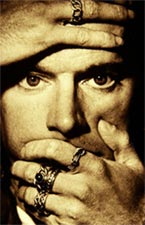|
|
| Help | |
| You are here: Rediff Home » India » Get Ahead » Living » Lifestyle |
|
| |||||||||||||||||||||||
|
| |||||||||||||||||||||||
 ost of us prefer to believe we aren't biased.
ost of us prefer to believe we aren't biased.
That some of our best friends are gay feminist women scientists of mixed black, Arab and Muslim ethnicity.
 Except for the very few who are card-carrying bigots and proud of it, the educated and liberal prefer to believe that they see the world without blinkers of prejudice.
Except for the very few who are card-carrying bigots and proud of it, the educated and liberal prefer to believe that they see the world without blinkers of prejudice.
My belief in my own lack of bias lasts for an hour, which is as long as it takes me to perform five simple tests at the Project Implicit web site.
Each Implicit Association Test lasts about 10 minutes and claims to measure the degree to which you subscribe to latent stereotypes.
The format is based on word association. The test is designed to be performed at high speeds, so that you are measuring instinctive responses rather than more conscious attitudes.
If you slow down too much, your results will be invalidated. The IAT depends heavily on the nature of the web; the paper version yields less accurate results, because users have more time to think about their actions.
At the end of the process, like so many others who have taken the tests, my sense of self has been shaken badly.
Initially, I am rather pleased at the slight preference for gays over straight people, the slight bias for Muslims over Hindus, the slight leaning towards disabled over abled people -- it goes with a certain liberal self-image.
Until other tests reveal a slight preference for career over home, a slight bias in favour of women over men. And it dawns on me that I am not unbiased -- I am just an over-compensator.
I am shocked to discover I seem to believe that men and science go together more than women and science. Or that I have a slight leaning towards thin rather than fat people.
I repeat the tests over a period of a month; the results stay the same.
The backgrounders are soothing: they tell me that most unconscious biases reflect the prevailing values of the culture around you.
The IAT was not designed as a tool to weed out racists or MCPs.
It measures unconscious bias, not conscious attitudes.
It was devised by Harvard psychologist Mazharin Banaji, along with Anthony Greenwald and Brian Nosek, in order to test the hypothesis that prejudice might be implicit rather than conscious, that biases build up over a period of time as a consequence of being exposed to stereotypes.
When Banaji took an early version of the test herself, she was surprised. Like so many other test takers, she had assumed she was not biased.
Malcolm Gladwell wrote about the experience of taking the IAT in Blink. He moved past the initial shock of discovering an apparent 'bias' to exploring what is, for many people, the real discovery: that the culture you are immersed in leaves its mark on your mind.
The IAT is hugely controversial. Some fear it might be used as a predictive tool, some cannot come to terms with results that demonstrate a bias they didn't think they had, some question the methodology.
Some of its findings are predictable -- there is a general preference for straight people versus gay people, for instance. But some are surprising -- minorities are just as likely to be biased against other minorities as majority groups are.
But the way in which the test is administered makes it less likely that users can get away with lying. (Everyone lies online; if you believed the data from site registration forms, you'd believe that 90 per cent of web users were Nobel-winning billionaires.)
People have tried to fake the IAT by deliberately hitting the wrong button, but that hasn't worked; the only ones who have faked the test are 'highly motivated' people who have managed to hold counter-stereotypes in their heads for those crucial 10 minutes.
Currently, roughly 8,000 people take the test each week.
There is a separate section for India where you could test your attitude to Pakistan vis-�-vis India, to India vis-�-vis the USA, to Muslims and Hindus, gender issues and a few other subjects.
It can be challenging doing these specific tests. The good part is that it might force us to re-examine our notions of nationality, religion and gender.
By the nature of the web, the IAT's samples from the subcontinent will be skewed -- most Indian or subcontinental test takers will be from the diaspora or from a relatively well-educated, urban and privileged segment of India.
These are precisely the groups you would expect to be the most free of bias. But in the US and the UK, the IAT has revealed astonishing insights into the nature -- and prevalence -- of prejudice.
'Know thyself': it was never this easy or this unsettling!
Powered by
|
|
| © 2008 Rediff.com India Limited. All Rights Reserved. Disclaimer | Feedback |